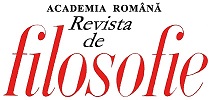Responsibility and Identity at David Hume
Responsabilitate și identitate la David Hume
Author(s): Emanuel FlorescuSubject(s): Ethics / Practical Philosophy, Early Modern Philosophy
Published by: Editura Academiei Române
Keywords: Hume; necessary connection; personal identity; moral responsibility; ethics; necessity; liberty;
Summary/Abstract: David Hume is one of the most acclaimed but also controversial modern philosophers. He treated various philosophical topics in his own way, which he related to criteria and methods of empiricism in the sphere of epistemology. Among these topics are the doctrine of liberty and moral responsibility, but also the concept of personal identity. Hume admitted that man is a free and responsible being, as he possesses a sense of morality, but challenged the traditional interpretation of rational, conscious man as an identical, unitary and constant self throughout his life, on the grounds that there would be no strong impression of such a self. The problem is that the two approaches cannot be associated in a coherent vision of man. If man has no permanent personal identity, he can have no personal and real moral responsibility, for he could no longer be a constant moral agent. Logically, a necessary connection must be admitted between the ethical idea of personal responsibility and the anthropological concept of personal identity, for otherwise the whole Humean vision would be incoherent, unsatisfactory and even contradictory. Lacking this necessary connection, the objections to his philosophy prove legitimate.
Journal: Revista de filosofie
- Issue Year: LXX/2023
- Issue No: 4
- Page Range: 421-436
- Page Count: 16
- Language: Romanian

